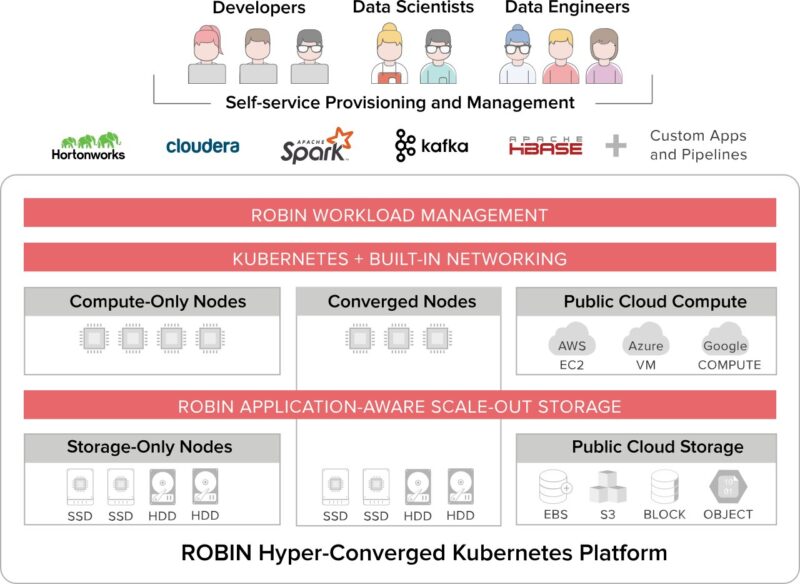Big Data-as-a-Service with Kubernetes – Solution Brief


Automate your Big Data infrastructure using cloud-native architecture and Robin big data-as-a-service. Improve the agility and efficiency of your Data Scientists, Data Engineers, and Developers.
Highlights – Big Data-as-a-Serivice with Robin
- Decouple compute and storage and scale independently to achieve public cloud flexibility
- Migrate big data clusters to public cloud or leverage public cloud to off-load compute
- Provision/Decommission compute-only clusters within minutes for ephemeral workloads
- Provide self-service experience to improve developer and data scientist productivity
- Eliminate planning delays, start small and dynamically scale-up/out nodes to meet demand
- Consolidate multiple workloads on shared infrastructure to reduce hardware footprint
- Trade resources among big data clusters to manage surges & periodic compute requirements
Top 5 Challenges for Big Data Management
Big data has transformed how we store and process data. However, following challenges keep organizations from unlocking the full potential of big data and maximizing ROI:
»Provisioning agility for ephemeral workloads: Certain workloads, such as ad-hoc analysis, require significant compute resources for a short period of time. Developers need the ability to quickly provision and decommission compute-only clusters for such workloads.
»Separation of compute and storage: Big data needs converged nodes with both compute and storage for data locality. However, compute is significantly more expensive than storage, and with ever-increasing data volumes, infrastructure costs are rising.
»Dynamic scaling to meet sudden demands: If critical services such as the NameNode run out of resources, it is not easy to scale-up nodes on the fly to add more memory or CPU.
»Cluster sprawl and hardware underutilization: Due to lack of reliable multi-tenancy and performance isolation, Hadoop Admins often deploy separate clusters for critical workloads, resulting in cluster sprawl and poor utilization of server resources.
»Cloud migration: There is no easy way to migrate big data clusters to public clouds, or leverage public cloud compute and storage as needed for on-prem clusters.
Robin Hyper-converged Kubernetes Platform
Robin platform extends Kubernetes with built-in storage, networking, and application management to deliver a production-ready solution for big data. Robin automates the provisioning and management of big data clusters so that you can deliver an “as-a-service” experience with 1-click simplicity to data engineers, data scientists, and developers.
Get big data-as-a-service with Robin


Solution Benefits and Business Impact
Robin brings together the simplicity of hyper-convergence and the agility of Kubernetes for big data-as-a-service.
Deliver Insights Faster
Self-service experience
Robin provides self-service provisioning and management capabilities to developers, data engineers, and data scientists, significantly improving their productivity. It saves valuable time at each stage of the application lifecycle.
Provision clusters in minutes
Robin has automated the end-to-end cluster provisioning process for Hortonworks, Cloudera, Spark, Kafka, and custom stacks. The entire provisioning process takes only a few minutes.
Provision compute-only clusters
You can create and decommission compute-only clusters for Hortonworks, Cloudera, and your custom big data stacks. Perfect for ephemeral workloads, these clusters simply point to existing data lake cluster in your organization, do the required processing, and store the data in the target systems.
Eliminate “right-size” planning delays
DevOps and IT teams can start with small deployments, and as applications grow, they can add more resources. Robin runs on commodity hardware, making it easy to scale-out by adding commodity servers to existing deployments.
Scale on-demand during surges
No need to create IT tickets wait for days to scale-up NameNodes, or to add more DataNodes. Cut the response time to few minutes with 1-click scale-up and scale-out.
Reduce Costs with Robin Big Data-as-a-Service
Decouple compute and storage
Enjoy the cost efficiencies by decoupling compute (CPU and memory) and storage. Store massive data volumes on storage-only inexpensive hardware, and use compute efficiently to process the data when needed. Simply turn on data locality with 1-click when you really need it.
Improve hardware utilization
Robin provides multi-tenancy and role-based access controls (RBAC) to consolidate multiple big data and database workloads without compromising SLAs and QoS, increasing hardware utilization.
Simplify lifecycle operations
Native integration between Kubernetes, storage, network, and application management layer enables 1-click operations to scale, snapshot, clone, backup, migrate applications, reducing the administrative cost of your big data infrastructure.
Trade resources among clusters
Reduce your hardware cost by sharing the compute between clusters. If a cluster runs the majority of its batch jobs during the night-time, it can borrow a resource from an adjacent application cluster with day-time peaks, and vice versa.
Future-Proof Your Enterprise
Migrate or extend to public cloud
Robin provides 1-click lift-and-shift for big data clusters. Simply clone your entire cluster and migrate to the public cloud of your choice. You can also scale-out your clusters to the public cloud from on-prem to create hybrid cloud environment.
Standardize on Kubernetes
Modernize your data infrastructure using cloud-native technologies such as Kubernetes and Docker. Robin solves the storage and network persistency challenges in Kubernetes to enable its use in the provisioning, management, high availability and fault tolerance of mission-critical Hadoop deployments.
No vendor lock-in
Kubernetes-based architecture gives you complete control of your infrastructure. With the freedom to move your workloads across private and public clouds, you avoid vendor lock-in.
